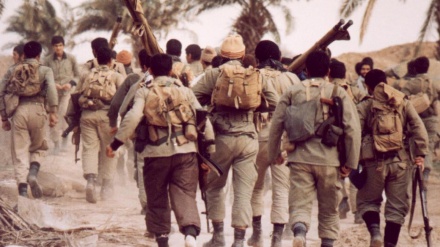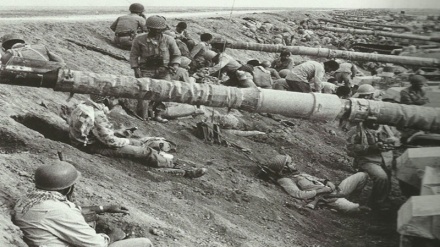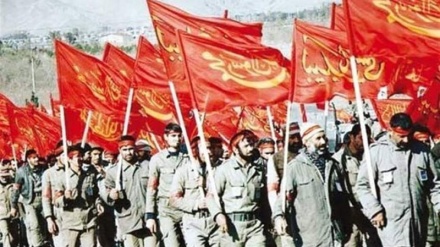Glimpses of Epic of 8-Year Holy Defense (42)
During the eight months of the second year of the US-imposed war through Saddam, four operations were carried out the greatest of which was Bayt ul-Moqaddas in terms of the area of operation and the number of forces involved. The operation inflicted a major blow on the Ba'athist enemy and changed all the equations and shattered all dreams of the Iraqi military.
Many foreign military analysts were surprised at the speed of action and operational features of Iranian forces during the liberation of Khorramshahr. US papers such as the New York Times, the Washington Post and the Chicago Tribune described the situation in Iraq very disappointing. With a lot of analyses, they expressed their concern over the imminent victory of the Islamic Republic in the region and called on the Americans to deal actively with the developments in the region. Los Angeles Times wrote: “Any development in the region endangers the US interests; therefore, Iran’s attack which started Friday is of great significance for the US. It seems that Iran’s victory will sadden and disrupt the tranquility of US friends.”
Following the liberation of Khorramshahr, creation of new conditions and the high likelihood of Saddam's collapse, one of the immediate tricks to stymie Iran’s successive victories was to stop the war.
Daily Liberation wrote in this regard: After the recapture of Khorramshahr by Iranians, the US, Europe and some of the Persian Gulf states have taken various initiatives to end the war to prevent the collapse of Saddam. New York Times quoted US state department officials as saying: the US has urged the Islamic countries to pressure the Islamic Republic to reach agreement with Baghdad.
The US demand from the regional states, based on pressuring Iran to accept ceasefire, showed the way Americans view the nature of peace. In fact, the concept of peace in the eyes of the Americans and all the efforts pursued by western regimes and their regional myrmidons in the Persian Gulf was essentially aimed at preventing the collapse of Saddam and exerting pressure on Iran to abandon its rights. Also, the continuation of the war in such conditions would lead to the loss of the illegitimate interests of the west and the US in view of the psychological conditions of the Iraqi army and the undeniable superiority of the Iranian combatants.
Saudi ruler Fahad's comments about the spread of regional "instability" by the war indicate the intensity and depth of Saddam's supporters' concern over continuation of war in those circumstances. The Saudi regime's monarch said: The continuation of war or its spread will only bring instability and insecurity. That is why it is necessary to emphasize "peaceful" efforts in every possible way. Following the immediate summit of the Persian Gulf littoral states, the foreign ministers of these regimes, while studying the conditions in the region and the shaky state in Iraq, declared that the end of the war is vital for maintaining what they described as stability and security in the region.
As we stated peace and stability in the sense that the US and its allies and accomplices express and like to impose it on others, is quite different from the true meaning of these concepts. The stability desired by the US is to confront anything that opposes its interests anywhere in the world. Based on this concept, the Americans evaluated Iran's new position as a threat to their illegitimate interests. So, a so-called peace offer was proposed. The fact of the matter is that the US was pursuing other goals. Consideration of the facts and respecting the interests and rights of the Islamic Republic in the war required the establishment of peace and stability in its real sense in the region. The US silence against Iraq's invasion of the Islamic Republic, which indicates secret coordination with Iraq, naturally encouraged the Iraqis to continue their aggression. Demanding unconditional withdrawal, immediate evacuation of the occupied lands and the establishment of a ceasefire were the first and the foremost natural rights of a country that was violently attacked in a war of aggression. Moreover, the request for determination of the aggressor and compensation of the expenses of the war were other requests of the invaded country, in this case Iran. But the US and other supporters of Iraq kept rejecting the conditions of the Islamic Republic and only tried to impose their narrative of peace on Iran. Thus, then two big powers and their satellites were seeking to help Iraq gain at the negotiating table what it failed to gain in the battlefield. The US efforts to support Iraq and equip this regime and force the Islamic Republic to accept the imposed peace, on the one hand; and the Zionist regime's invasion of southern Lebanon on the other hand put the Islamic Republic in a very difficult position.
Following the liberation of Khorramshahr, there were three main strategies ahead of the Islamic Republic of Iran: First, the acceptance of ceasefire without announcing the end of the war and the beginning of political talks. Secondly, continuing the war without entering Iraqi territory and trying to achieve the desired goals. Thirdly, continuing the war to achieve the goals without any restrictions on entry into Iraq. With the military pressure exerted on the Ba'athist regime during Bayt ul-Moqaddas operation and withdrawal of major parts of Iraqi army from Iran, Saddam welcomed announcement of ceasefire. But from the viewpoint of the Iranian officials, the ceasefire was meant to allow Iraqi regime to achieve the political goals of the war. So, after two meetings of the Supreme Council of Defense, Iran decided to continue the war until complete liberation of all occupied lands and the realization of its goals of war. Akbar Hashemi Rafsanjani, then speaker of the Islamic Consultative Assembly, in an interview on May 26, 1982, stated Iran’s conditions to end the war as follows: “We did not start the aggression but we always defended against it and because the war was imposed on us and our rights were violated, we announced our rights. One is the exit of the enemy from Iran’s territory, which they have not done; but our combatants with full capability cleansed a large part of the Islamic land from the enemy. The other issue is compensation that should be paid to us. And the third issue is the Ba'athist Party’s crimes against the Islamic Ummah and that it does not have any other jurisdiction after such a crime. But to the extent that we have the right in the international arena, we have the right to pursue Saddam as a war criminal. The last issue is the return of Iraqi refugees to their country.
FK/RM/ME


